You’d think that situation would turn me away from gratitude, but I had an experience the other day that turned me around. I realized that anyone can adapt to undesired change. You just need to find your new joy. Coming to terms  We’re all creatures of habit, and I certainly have habits when it comes to the holidays. As I just mentioned, many of those habits involve food. My condition won’t last forever. One day my recovery will end. I don’t expect I’ll go back to how I was before my first ER visit, and I’m not sure I’ll want to go back. But I am sure I’ll want to partake of my favorite foods occasionally — and indulge a bit when the annual holidays come around. That’s all cold comfort for me right now. Or at least it was. Sure, the thought of being around people gorging themselves on delicacies I can’t now enjoy doesn’t exactly fill me with delight. I already cancelled my birthday food plan. Now I’ll need to cancel my food plans for Thanksgiving and probably also Christmas and New Years. You’d think I wouldn’t have gratitude from this — and you’d be right before I had this wonderful experience the other day. Seeing new perspectives I was shopping for some new diet items and of course conscious of the items in others’ carts — items I wanted in mine but dared not on penalty of pain. So I tried distracting myself by focusing on accomplishing the task before me. I would get what I needed and go. That’s when the thought came to me. I’m not that bad off. First, I’ve been moving towards my present diet for some time in increments. I just didn’t want to surrender my favorite foods completely. My current condition won’t tolerate the increments; I have to be there now. That sudden shift gives new perspective on how much moving in small increments was really worth, and that’s something to be grateful for. Second, removing those foods from my diet left a lot of space, so I’ve been searching out recipes online that meet my restrictions. One by one, I’m finding them. Not only that, I’m finding new worlds of flavor as I avoid usual fillers like sugar and embrace spices and seasonings. I’m not sure I’d have all these wonderful new taste experiences without my health challenges driving me, and that’s something to be grateful for. Third, many of these recipes are so easy to make and way cheaper than the pre-packaged versions that I’m finding a new perspective on convenience. The short term convenience of time I get a can or a box doesn’t outweigh other conveniences like more flavor in my mouth, more health in my body, and more money in my bank account. All that’s something to be grateful for. Finding new joys When I put it all together, I have an experience I wouldn’t otherwise have. And that gives me a new perspective on not just my health but also living my life and finding more joy in it. Yes, I’ve had some undesired changes in my life, but I still have access to joy. It’s not the same joy I had previously; my circumstances won’t permit that. But new doors open for every old one that closes, and behind those new doors are new experiences, perspectives, and joys that all give reason for gratitude. So even though I won’t be partaking of the usual Thanksgiving Day feast tomorrow, I will be reflecting on how grateful I am for the new joys I’ve found and continue to find in my new life. So when your situation changes in a way you really don’t want, please take a moment to consider what you do have and find your new joy. You’ll gain new perspectives and new experiences you’ll wish you would have found earlier, and you’ll find yourself grateful you did find them. And that will bring you more joy in your journey.
0 Comments
That attitude can greatly bless the lives of us LDS singles as we interact with each other. Too often we see opportunities to interact through the lens of dating, which often pulls us away from blessing others’ lives. Seeing through the lens of friendship, we’ll more often provide needed assistance. It’s time for LDS singles to re-hoist friendship in dating and singles groups. Just listen  In the video, John admits he couldn’t “fix” Troy, nor did he attempt to. In fact, the casual observer might conclude John didn’t do much at all. John certainly wanted to help, but given everything so many others were doing, John didn’t see much for him to do. Then he started doing something more of us need to do more often; he listened. John invited Troy to ride with him in his truck and let Troy say whatever he wanted. John simply listened. There’s probably a lot the video doesn’t show. But the simple act of listening is beyond profound. We all have a basic human need to be heard and to feel understood. By not directing Troy or trying to give him something, John showed complete respect for Troy’s agency. And by simply listening to Troy, John declared he would stand by Troy regardless of the path Troy chose or what pace he pursued. That’s the mark of a true friend. What blessing could we be to other LDS singles if we simply listened more? Instead of interacting only with those whom we want to date, what if we interacted with everyone with an interest in understanding them or simply letting them be heard? By putting aside the personal agenda, we re-hoist friendship to its rightful valued place. See sameness  Many LDS singles see a duality in their local Church community, especially in geographic wards. There’s the singles and the marrieds. It’s an extremely common perspective among singles. But the story in the video takes a different perspective. The two groups there were the grieving (Troy and his family) and the supporters (everyone else trying to help). That’s significant. John viewed Troy as a brother, not someone fundamentally different. If we LDS singles could see one another more as brothers and sisters, we could re-hoist friendship in a new culture of togetherness. Now, I know some of you are saying. “Yeah, but John and Troy are both married, so of course John would see Troy as one of his group.” Perhaps, but John could’ve found a substantial enough difference if he looked for it. The point is he didn’t. He saw Troy as just as much a person as he was, and that view allowed him to feel more compassion and more desire to be the true friend he was. Involve others 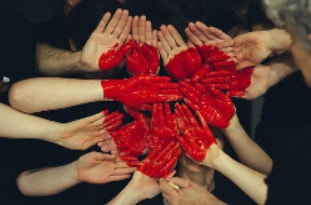 John also involved others in demonstrating support for Troy. The scene where John and the group present the jersey to Troy just jerks my tears. Then there’s what appears to be his ward releasing balloons in celebration of his son’s birthday. As John continued standing by Troy, many other opportunities to show support probably presented themselves. And they all helped Troy along his path. What if we singles involved one another in supporting each other? What if, instead of everyone doing their own thing, everyone reached out to include everyone? What if we each told each other, “Come talk with me,” “Come sit with me”, and “Come do what I’m doing with me”? Real friends bring everyone in. That may be the best support for singles dealing with their pain and grief, many of whom struggle unbeknownst to those around them. Let’s re-hoist friendship in all our interactions with each other. By listening to one another, seeing one another as brothers and sisters, and involving others in building community, we not only embrace but also embody true friendship. By bringing ourselves closer to each other, we bring ourselves closer to God. And that will bring us more joy in our journey.
Elder Christofferson approached belonging from a doctrinal perspective with practical application to belonging. That approach confirmed what we’ve been discussing here for years on Joy in the Journey Radio. But it also enlightened my understanding of what it means to belong. It’s easier to feel belonging when we truly understand the doctrine of belonging. See the commonalities  Elder Christofferson begins by listing the three parts of the doctrine of belonging: “the role of belonging in gathering the Lord's covenant people, the importance of service and sacrifice in belonging, and the centrality of Jesus Christ to belonging.” Let’s talk about how each of these parts relates to LDS singles. As the Lord gathers His covenant people across the world, we’d expect, as Elder Christofferson rightly notes, Church membership to become more diverse. We see that diversity today in every conceivable way, including life situation. This diversity offers great strength and richness but also great challenge as our biological hardwiring influences us to compare ourselves with others in order to assess how “normal” we are. Without context, such comparisons can demoralize and depress us. Elder Christofferson illustrated this effect in the story of Jody King, a married woman confronting infertility. As I listened to the heartrending emotions expressed in Sister King’s experience, I recognized a great parallel. You could change the details of her story from would-be-mother to would-be spouse, and the emotions would stay the same. We need to see less of the details differentiating us and more of our commonality as children of God. Elder Christofferson recognized that need when he taught,
We too should care about what others around us are becoming more than what they are today. Serve one another  In addition, we gain a sense of belonging within the Church as we serve and contribute to the larger Church community. This makes obvious sense and yet the realization of its truth escapes many of us precisely because it is so simple. We feel like we belong to a larger group when we do what those in the group do. Singles don’t do everything marrieds do (or at least they shouldn’t), and that distinction highlights the earlier distinction of identity (“I’m single and you’re married”) that destroys any feeling of belonging. But serving one another is something everyone can do. Being true to as many covenants as one’s made is something everyone can do. When everyone serves everyone else and turns their focus there, we see ourselves more doing what the group does and foster the sense of belonging we crave. Elder Christofferson recognized this truth as he shared,
How often have we singles focused excessively on our own unmet needs? Think back to such a moment in your life and consider whether you felt like you belonged to the larger Church community in that moment. However legitimate your unmet needs, focusing there always leads to feelings of isolation and abandonment, not belonging. Come unto Christ Of course, the highest and most important sense of belonging comes through Christ. We best promote that sense of belonging by nourishing a personal relationship with Him. We must spend time with Him daily. As I think back upon my many years of LDS singles life, I can remember many struggles with finding acceptance within my peer group. What helped me the most in those times was remembering He Who “came unto his own, and his own received him not” (John 1:11). Leveraging my struggle to feel closer to the Lord has helped me feel more belonging to Him, the only sense of belonging that really matters in the end. Elder Christofferson displayed that perspective as he declared,
LDS singles must live the doctrine of belonging in order to thrive and experience maximum joy despite their circumstances. As we identify as members of the covenant, strive to keep those covenants while serving one another, and spend time daily nourishing our relationship with the Lord, we can gain a sense of belonging to Him and His Church. And that will bring us more joy in our journey.
Today will soon be yesterday  Time passes by so quickly. It seems only yesterday I came home from my mission. Yet in reality it’s been not one day but almost 10,000 days — 27 years. That number staggers my imagination. And what changes have occurred in all that time? I’ve grown in ways I never imagined when I looked into the future 27 years ago. Many are quite positive, but many have me living far beneath my dreams. Comparing what I saw for myself then with what I see in myself now reveals vast differences that beg the questions: How did I get here? How did it come to this? Many LDS singles ask themselves similar questions as they take stock of themselves. They live far beneath the dreams they had when they were younger. And with the world becoming ever more chaotic, they wonder how those dreams have any chance of coming true. Much lies outside your own individual power to change, but much more remains within it. As President Nelson reminds us,
That last part — how you spend your time each day — is key. Your best life is the collection of results you desire. Results come only from action. And every action, in order to exist, must occupy space and time. You can’t change the past, and the future’s always a day away. All you have is here and now. And it turns out that’s all you need to begin living your best life. It’s time to start moving Far too many of us hold ourselves back from our best life. We focus on the obstacles instead of the opportunities. We keep looking for and listening to excuses instead of ways to move forward. And without forward motion, we’ll never develop the momentum we need to push through tough times. Some hear these arguments and decide to fool themselves. They leverage lessons from their past to formulate brilliant plans for moving forward. They feel good about themselves after spending inordinate amounts of time planning and preparing. But those good feelings never translate into a new life. Their actions don’t deliver the results of their dreams but rather trick their minds into thinking they’ve done something substantial when in reality they haven’t. President Nelson understood that situation. He taught,
It’s forward momentum that keeps you moving from one success to another. Momentum carries you through life’s rough seasons and makes your dreams come true. And the only way to get momentum is to start moving and then keep moving. Now is the time to start moving. Right now is the time Everything we talk about on Joy in the Journey Radio is meant to help LDS singles live their best life. And all of it will mean absolutely nothing for you unless you wield your power of agency to do what you can with what you have right here right now. All you have is this moment. When you waste it, nothing in your life changes, at least not for the better. So don’t waste it. Begin gathering momentum now. Live within your covenants more completely now. Make more time for the temple now. Take more action towards the results you want in life now. Now is the time because now is the only time you have. Once the present becomes the past, you can’t change it. And when you allow enough present moments to become past regrets you can’t change, your present life falls far below your dreams, leaving you to wonder how you ever got there to begin with. Don’t wait, and don’t doubt yourself. Start taking action towards your best life. Now is the time. When you diligently take advantage of each present moment, they’ll become past successes that taken together will lift you into your best life. And that will bring you more joy in your journey.
Faith clarifies vision We all judge too much by what we see directly around us, and this feature especially manifests itself in dating. Far too often LDS singles look around for someone they’d like to date and, not seeing what they define as acceptable, quickly become discouraged. That scene repeated often enough leads to hopelessness in the future. Bright futures start with faith. Faith helps you see what’s there but not readily seen. In the context of dating, this could mean, first, you don’t see that acceptable candidates around you because they aren’t doing what you normally do and going where you normally go. When you branch out and see new vistas, you’re more likely to cross paths with them. The world is a bigger place than your own backyard. Second, faith helps you see the person you discounted may be the one you’re looking for. So many singles insist on having the “perfect” partner that they reject knowing many less-than-top-shelf candidates who’d make good partners. Falsely assuming only the best can produce joy in life has kept and continues to keep many LDS singles single long than need be. Action feeds power Lack of hope in the future often attends feeling powerless. A focus there will lead only to despair. To change your reality, you must change your focus. Instead of focusing on the “evidence” for why what you want won’t happen, seek out reasons to believe. Those reasons to believe will be easier to embrace when you take proper action. I’ve never seen anyone busy working to make his or her dreams a reality feeling powerless, and neither have you. That’s because it’s impossible. When you busy yourself with the business of doing, you’re so immersed in evidence of your own power you can’t feel powerless. It’s when you’re not doing anything that feelings of powerlessness can take hold. Start feeling that power and savoring your life by listing what makes up your best life. If you could have your best life, what would it look like? What would you be doing? Put those activities on your list. Then start to fill your calendar with those activities. So if you think your best life involves horse riding, great. When are you going to ride that horse? If you think your best life involves learning how to crochet, great. When will you learn that? Whatever you want your life to be, start doing what you can to live that life. Don’t let what you lack prevent you from embracing — and finding joy in — what you already have. Partner with Him While you’re making that list, don’t forget to partner with the Lord. When you include Him in crafting your best life, you’ll get there much more easily than if you go it alone. He might even help you see that what you think is your best life really isn’t. Make the course correction He suggests, and you’ll not leave any joy on the table. The key to maximizing joy in life is focusing on fundamentals. Far too many LDS singles focus on finding ways to cross paths with that special someone, all the while forgetting that if they aren’t agreeable enough, no quantity of paths crossed will produce the desired result. When you focus first on living your best life as much as you can, you make yourself more agreeable and your life more inviting. That life is also the more joyful one, and that joy will only increase your attractiveness to a potential companion. The future really is as bright as your faith. When you focus on fundamentals, you can take more effective action. More effective action produces more effective results. More effective results will help you feel more powerful and desirous to do more, and thus the cycle continues ever upward. And that will bring you more joy in your journey.
What impressed me the most in that meeting was a Japanese sister. As she rambled on in her broken English from one topic to the next, I struggled to make sense of what she was trying to say. But then she spoke two words that captured my attention: Expect miracles. Nourish your thinking I have no idea why she said those two words. Perhaps she was referencing President Nelson’s address from the last Conference on spiritual momentum. Perhaps she was talking about something else related to miracles. Or perhaps she was talking about something completely unrelated and the Spirit prompted her to say those words because I needed to hear them. I say I needed to hear them because they captured my attention. And as I began pondering those words and remembering what I said about them in a recent episode of this program, I immediately felt prompted to make them the focus for this episode of Joy in the Journey Radio. So perhaps there is someone out there who needs this message. Regardless of the need, I do believe this message is important for all LDS singles to review on a regular basis. We need to nourish our thinking with better assumptions, better perspectives, better attitudes, and better self-talk. The idea of expecting miracles encompasses all four of those elements. Reformat and reboot For example, too many LDS singles assume the future will be just like the past. They place so much emphasis on the choices others make, they do not perceive the power inherent in their own choices. A discouraging outlook encourages a despondent attitude. And all of these elements then find reinforcement in self-talk: “What’s the point of trying?” “Why would anyone choose me?” “I’m not good enough.” “I’ll never be loved.” All these messages played on autopilot via habits of thinking reinforce the faulty assumptions, the diminished perspectives, and the failing attitudes that will never lead to success. Expecting miracles reverses all that. Expecting miracles in your life assumes miracles can and will come to you. Expecting miracles exchanges the perspectives focused on the past for ones focused not just on the future but on a future that’s very different from the past. Expecting miracles encourages an optimistic positive attitude. And expecting miracles encourages uplifting self talk: “I’ll keep trying because I will succeed.” “My miracle will choose me.” “I’m more than good enough for my miracle.” “My miracle will happen because I’m already loved.” There’s a night-and-day difference between expecting miracles and the less effective ways of thinking many LDS singles choose to tolerate. Many so choose because they simply aren’t aware of the difference. But having that awareness, why would you choose not to expect a miracle? Why would you cheat yourself of the glorious best life you could have? Position yourself better Of course, miracles are more likely to come and are therefore easier to expect when you get your game on. Put yourself in a good financial position. Serve faithfully in your Church calling. Take care of your responsibilities, including those involving self-care. These changes likely won’t come overnight, but every effort to move in that direction moves you closer into a space where miracles can more easily come. My friend provides a good example. His real interest in attending that Sunday School class was a special “person of interest” (as he calls her). During the drive back, he told me they’d met only one month ago. I was surprised to hear that. Given the way they hugged each other in the parking lot before leaving, I thought they’d known each other longer. But apparently they just hit it off really well. I’d call that a miracle. So expect miracles in your life. Believing in and opening yourself up to possibility can improve your probability of success. By working as you can on improving yourself and your situation, you can move yourself into the space where your miracle can more easily come. That miracle can be the door that swings your best life wide open to you. And that will bring your more joy in your journey.
What impressed me about Sister Porter’s approach was her use of singles to exemplify her ultimate message of the valuable contribution LDS singles can make in their world. It’s a message we’ve been promulgating here at Joy in the Journey Radio by encouraging LDS singles to adopt a personal ministry. We all can powerfully influence those around us for good, and we’ll make that difference in others’ lives when we heed the lessons at the well. You determine your future I love the introduction Sister Porter gives to her remarks. She was happily married and serving with her husband in the Church in Eastern Europe. Then her husband’s health took a turn for the worse, and in short order she found herself single. I don’t know if she actually thought of herself as single. She didn’t mention that in her address, and I know many who’ve lost a spouse to death still consider themselves married by virtue of their temple covenants. If your spouse is not in this life living with you, you may be married for the purposes of eternity, but for the purposes of this life, you’re single. You also have a wonderful opportunity to effect much good. It starts when you realize your past and present circumstances don’t determine your future. In referencing her unexpected return to singlehood, Sister Porter shared,
The woman at Jacob’s well exemplified this attitude, which applies just as much to men as it does to women. She did not allow her past or present condition to determine her future. She chose to testify of the Savior, and her choice blessed many others. You have the power  Likewise, LDS singles can chose to embrace a new future by making the higher choice. Too often LDS singles play the victim, thinking that their past is prologue and nothing they do will make any difference. But that’s true for you only if you decide it is. You’ve been blessed with agency, the second most underappreciated gift of God. And it’s the second most underappreciated gift of God because so many simply don’t realize the power that’s in them because of this gift. Sister Porter recognized it. After quoting D&C 58:26-28 and emphasizing that last phrase in the verses — “for the power is in them” — she declared,
You’re not in this alone! No matter your past or present circumstances, you can choose to let your light shine, share your goodness with others, and put a dent in the universe. With the creator of heaven and earth at your side, why choose anything else? You make the difference This is how great ends come out of small beginnings. The Lord is the Master Gardener, the one best suited to help you grow into the fullness of your potential. He can transform the seemingly meager contributions you make into extraordinary differences. Sister Porter shared three examples from the Master’s teachings that demonstrate this effect, one involving salt, one involving leaven, and one involving light. Each of these items in even seemingly small amounts makes a tremendous difference in their separate contexts. Likewise, though your efforts may seem small and inconsequential, you can make a tremendous difference in your world. Your salt can flavor the lives of others, your leaven can lighten their loads, and your light can disperse the darkness surrounding them. As Sister Porter taught,
Heed the lessons at the well and make the higher choice. When you do, the Savior can turn your seemingly small service into the difference others need in their lives. In easing the burdens of others, you’ll find your own burdens eased. In helping others grow, you’ll find your own growth. And that will bring you more joy in your journey.
See the situation 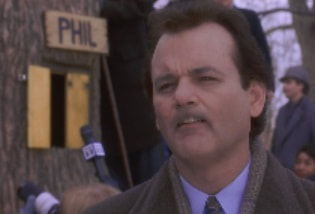 The story begins with Phil Connors, the weatherman for Channel 9 News in Pittsburgh. The man is clearly full of himself, so it’s no surprise no one really likes him, not even himself. He’s a rather disgruntled man who thinks covering the Groundhog Day Festival is beneath him. So imagine his shock when he wakes up thinking it’s February 3rd only to find out it’s February 2nd again. The bewilderment continues as each morning he wakes up to find that somehow in his sleep he went back in time by one day. He keeps living the same day over and over again. His first reaction is denial. This can’t be happening to me! Denial drives resistance, but no matter how he fights against his situation, the next morning is always February 2nd again. His denial then turns into despair. This report he gives at the festival summarizes his condition rather well.
That day ended in suicide, but it doesn’t end him. In despair, Phil keeps trying to kill himself in different ways trying unsuccessfully to escape his never-ending cycle. Note the pivot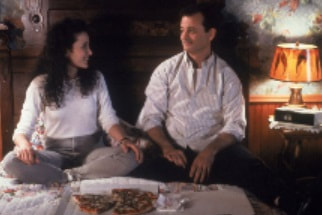 And then one of those February 2nd days becomes a pivot day when everything changes. Phil doesn’t escape the never-ending cycle, but he does find a new perspective on his situation. And what changed everything was Rita. Rita is Phil’s producer. She’s also the apple of his eye. Previously he spent God knows how many successive February 2nd days trying to get into her pants. But on his pivot day, Phil approaches Rita with a different agenda. Instead of trying to satiate his lust, he sincerely cries for help. (Why do I have a Rick Astley song in my head right now?) Rita helps him and in the process begins to fall for him. Of course, that disappears when everything resets the next morning. But Phil remains changed, and he starts spending his February 2nd days improving upon himself, working to become a better, more quality person. He takes up reading all kinds of books. He learns to play the piano. He takes up ice sculpting! Not only do his efforts make him a better person, they make his life more interesting. And the proof is in this report. It’s the same day, same festival, but a completely different Phil.
Once he stopped trying to escape his situation and embraced it, Phil was able to tap into the joy life has to offer every single day. In the end, he escapes the cycle and gets the girl. Take a lesson The allegory here to LDS singles is so clear I wonder why I didn’t see it earlier. How many of us singles are in denial? No, I can’t be single. This can’t be happening to me! And no matter what we do to fight it, we seem caught in a never-ending cycle of singleness from which we cannot escape. But if we’d stop trying to escape from it and start embracing it, we could turn everything around. We could start looking inside ourselves and working to become better, more quality people. We can do things to make our lives more interesting. We could tap into the joy God wants us to have every single day. And we could help other singles to have their pivot day. Just as Rita helped turn things around for Phil, we can reach out to one another. Instead of looking only to satiate our own agendas when we interact with each other, we could help each other live better lives. When we take a lesson from Groundhog Day, we can make the most of what seems to be a never-ending cycle of singleness. By embracing our situation instead of trying to escape from it, we can live our best life and help others to do the same. And that will bring us more joy in our journey.
That vote of no confidence really punched me in the gut. Initially I was in a daze, uncertain of my path forward. But as time lifted that fog, I began to gain some clarity and regain some perspective. If you feel that way, know that all is not lost. There’s always hope because there’s always Christ. That hope says you can change for the better. And you can keep that optimism when you treat every day like it’s your birthday. Live like a kid At my age, birthdays just don’t seem as special to me as they did when I was a kid. I’ve been there, done that, got the shirt and the hat, plus I chair the membership committee. (Would you like to join? We have jackets!) And that’s part of the problem. Something about becoming an adult sacrifices that childhood perspective of optimism and possibility on the altar of pessimistic reality. We’re more prone to point out barriers to justify why we won’t or can’t achieve than to believe that achievement is possible and look for a way to overcome the obstacle. We also lose the joy of childhood. The adult perspective is so often serious. Kids naturally approach their day looking for fun. They don’t worry much beyond the present; they live in the moment. Certainly there are times when we need to buckle down and do some serious work. But we could all benefit from introducing an element of fun into what we do and living in the moment. That’s what birthdays are all about for kids. They get absorbed in enjoying the moment. If we lived life like a kid, maybe some of our obstacles would disappear because our overly serious perspective that created them would be gone. Treat each day special Treating every day like it’s your birthday also recognizes the special gift each day really is. Too often we go through our days playing out habits that carry us from one moment to the next. And that lull of life lacks the joy each day can and does bring. That’s why a life on autopilot will never lead you to your best life. There’s nothing to savor in simply going through the motions. Very often, we go through those motions without any awareness of what we’re doing. That’s how we’re biologically hardwired to operate. Treating every day like it’s your birthday breaks you out of that mold. Because it’s not something you normally do, it doesn’t conform to routine or habit, which takes what you do out of the shadows and into the light of awareness. Being fully aware of what you’re doing does two things: (1) It opens you to the joy to be found in each moment of living, and (2) it increases your sensitivity to possibilities, allowing for creativity in finding solutions to overcome obstacles. Overcome your current challenges Applying these ideas to my current challenge, I can see a path ahead. I need to find someone knowledgeable I can trust to give me objective counsel and help me construct a plan going forward. And strangely I feel excited about that. Treating today like it’s my birthday brought me there. I’m looking for the joy instead of wallowing in the mire of misery. I’m embracing optimism in a brighter future that I can forge. I’m opening myself to the hope that always is because Christ always is. I’m tempering the responsibilities of adulthood with the perspectives of childhood. So treat every day like it’s your birthday. You’ll invite yourself to open more to possibility. You’ll do more to take care of yourself. You’ll experience more creativity as you embrace more optimism. And you’ll live your life more hopeful of the future that has you living your best life. And that will bring you more joy in your journey.
Focusing on incremental, one-percent improvements instead of some grand transformation intrigues me. I’m led to question not just what goals are best for me but the very process by which I determine those goals. After all, the process of improvement must be doable to mean anything. Focusing on being one percent better is not just doable but far more enriching than the alternative. Catch your vision Elder Dunn began his remarks by sharing the story of British cycling. For about a century, British bicycle racing teams won little distinction. Their performance was so poor some manufacturers refused to sell bicycles to them, for fear the association would irreparably tarnish them. But that changed in 2003 when a new coach, Sir Dave Brailsford, was hired. Sir Brailsford rejected using the latest trends and technology, preferring, as he put it, “the aggregation of marginal gains.” British cyclists began looking at everything they did and how they could improve by just one percent. The results were amazing. As Elder Dunn described,
He further explained,
After applying this approach over the past two decades, British cycling has amassed an impressive array of awards, including six Tour de France victories and more Olympic medals across all cycling disciplines than any other country. Clear your path This approach and these results together get me thinking. What if I’ve been going about this New Years resolution business all wrong? What if a shift in my focus towards small, one-percent improvements is what I’m really missing? I began by adjusting my goal creation process. Normally I start by reviewing my mission statement (which details my life purpose) and then my vision statement (which describes the characteristics of my ideal best self) to see if they still resonate with me. If they don’t, I make changes until they do. I then ask myself, “What portion of the gap between where I want to be and where I am will I work on this year?” and I make goals to address that portion. But I see now this approach invariably leads to biting off more than I can chew. I always justified it thinking it’s better to aim for the stars and miss than aim for a pile of dung and hit target. But by attempting too big a change, I set myself up for failure and disappointment. This year I’m trying a new approach. Keeping the mission statement review, I adjusted the vision statement review to describe what my best self looks like at the end of the year rather than the end of my life. I then scored myself on how well I meet that end-of-year standard today. Of course, that comparison finds me wanting, but that’s OK. Elder Dunn taught that
Stephen Covey declared the main thing is to keep the main thing the main thing. For achieving goals, the main thing is making sure to get just one percent better every day. Work your plan I tied each goal to a descriptive characteristic from my end-of-year vision statement to maintain alignment with my direction. Now the question each day is this: What will I do today to get just one percent better in each of my goals? I plan on evaluating my progress after each week and month to assess progress and adjust where needed. Focusing on improvements of just one percent each day seems like my missing essential element. I’ve already felt greatly encouraged applying this new approach for creating my goals, so we’ll see what develops in what I actually achieve. If making New Year’s resolutions you’re confident you won’t keep discourages you, or if the failures of previous attempts to achieve and become your best self dismay you, I invite you to consider focusing not on some grand transformation but rather on the one percent change you can make today. When you get one percent better each and every day, it won’t be long before you find yourself making remarkable progress. And that will bring you more joy in your journey.
|
Author
Howdy! I'm Lance, host of Joy in the Journey Radio. I've been blogging about LDS singles life since 2012, and since 2018 I've been producing a weekly Internet radio show and podcast to help LDS singles have more joy in their journey and bring all Latter-day Saints together. Let's engage a conversation that will increase the faith of LDS singles and bring singles and marrieds together in a true unity of the faith.
Comment
Joy in the Journey Radio encourages the free discussion of ideas but reserves the right to remove and/or block comments which do not conform to LDS standards.
Donate
Joy in the Journey Radio offers many free resources to help LDS singles everywhere, but it certainly isn't free! Help Joy in the Journey Radio in its mission to improve the lives of LDS singles by donating today.
Posts by Month
December 2022
Categories
All
|


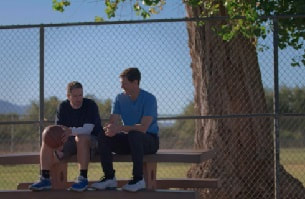
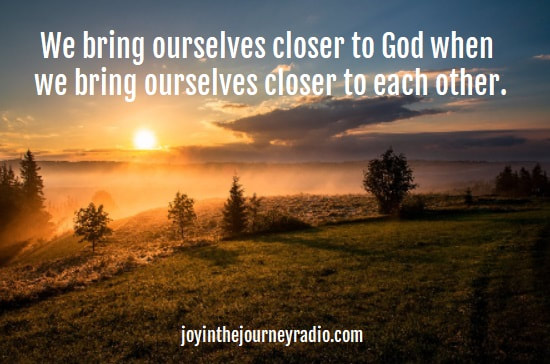
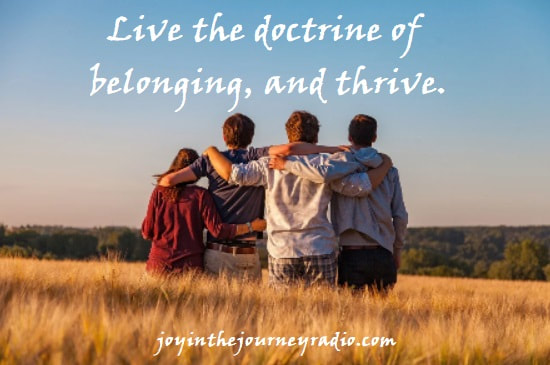
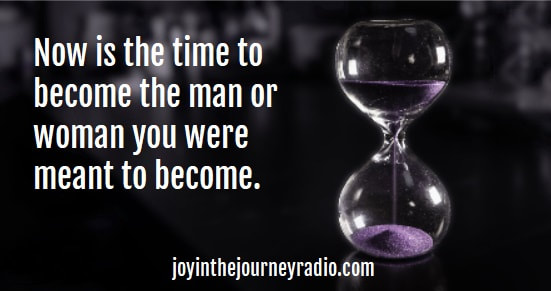




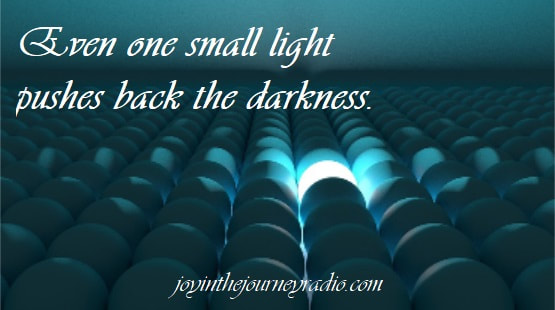

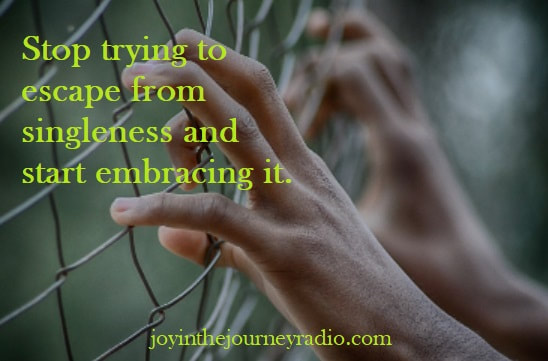


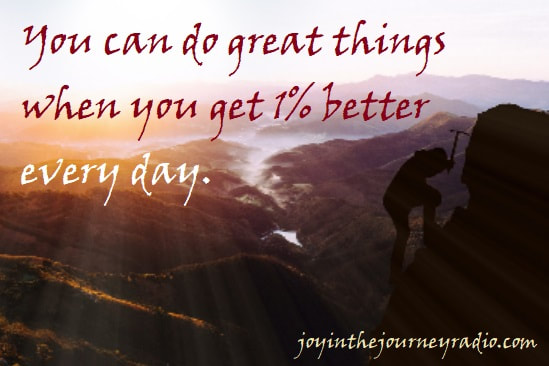
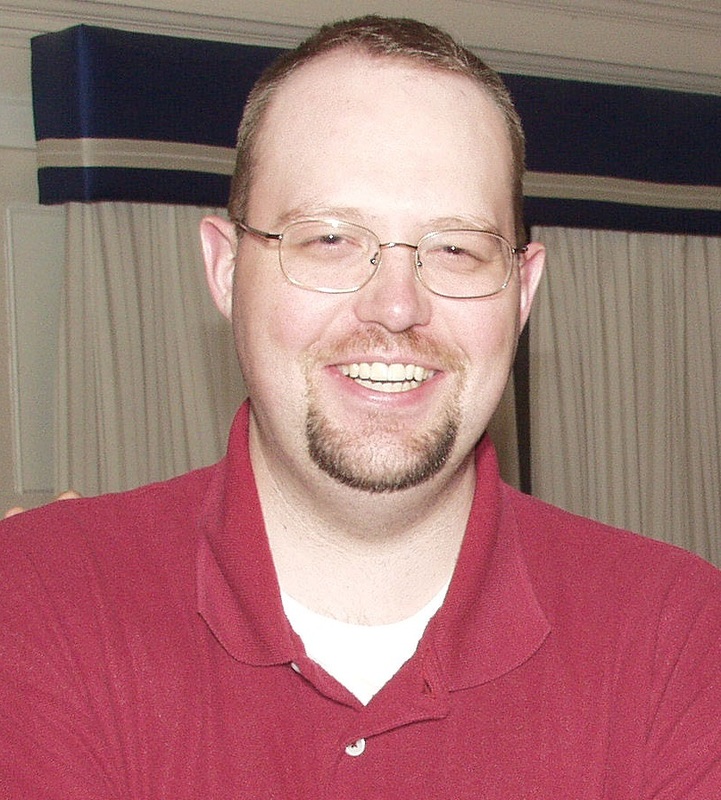
 RSS Feed
RSS Feed